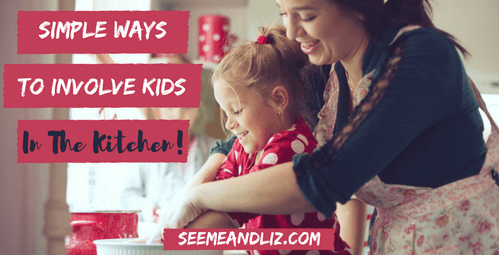It’s true, thinking of your young child “helping” in the kitchen is not a pleasant thought for many parents, including myself.
It’s difficult not to think about the mess they may cause, or the safety aspect.
However, we all know that the kitchen is one of the most social places in a home. This is where people gather to prepare meals and have conversations about pretty much anything.
It’s also one of the places so much learning happens.
This is even true for a kids play kitchen!
With all of this talking going on, the kitchen is actually a great place for a child to learn language as well as many other valuable skills including: safety, new vocabulary, nutrition, etc.
Surprisingly there are many fun and safe kitchen activities for kids! And all of these kitchen activities will seem like play time for your child.
By interacting with your child in the kitchen, you are also helping their language develop.
At What Age Can My Child Start With Kitchen Activities?
I started letting my children “help” in the kitchen around the age of 2.
This may seem young to some, and for some children this might be too young.
You know your child best so you will need to decide what you are comfortable with.
Children mature at different rates and ages so this needs to be taken into account.
Also, if your child has a disability or is delayed in certain areas, you may need to wait until they are a bit older.
No matter what age you start letting your child “play” in the kitchen, remember to keep the activities at their level.
Fun Kitchen Activities For Kids That Promote Learning
Doing The Dishes
I didn’t really let my children do the dishes until the age of 8 (but many parenting experts say that 6+ is fine assuming there are no sharp knives or fine china).
What I did do when they were younger was fill the sink with some warm water and a bit of dish soap and then throw in some plastic dishes and cutlery!
It’s just like doing the dishes in the eyes of a child. I started this with my children when they were each about 18 to 24 months old.
We used The Learning Tower to make sure there were no falls off of chairs!
Water play is a great time to work on language development and increase your child’s vocabulary.
For example:
- Talk about what you see: water, bubbles, plates, cups, forks, spoons, etc.
- Talk about what you feel: warm water, cold water, soft sponge/cloth, hard plate, wet, dry, etc.
- Talk about actions: washing, drying, splashing, etc.
Science Lab
You don’t need to purchase science kits for kids, however if you run out of ideas, they are a fairly inexpensive way to keep the science activities flowing.
Through science children can learn skills such as:
- prediction
- problem solving
- new vocabulary
- cause and effect
- asking and answering questions
- patience
A basic experiment you can easily do at home is to mix baking soda, water and vinegar together in a bottle.
My kids have done this experiment so many times, yet they never get bored of it.
They are fascinated by the fact that adding vinegar to the water and baking soda mixture can cause an “eruption”.
We have also done the Rubber Egg Experiment
Simply place an egg (raw, in the shell) into a clear glass or jar and cover it with vinegar.
You can add some food color at this point if you chose.
The next day, pour out the vinegar and add some new vinegar (with or without more food coloring).
By the following day, the egg shell will have disappeared to be replaced with a rubbery coating.
During this experiment you can ask your child questions such as:
- Do you think the egg in vinegar will float or sink?
- What about when the egg is in water, will it sink or float?
- What happens to the egg shell when it is covered in vinegar?
- Will the egg bounce? (once the shell has disappeared)
- Can the egg break? (once the shell has disappeared)
For more simple science experiments you can do at home, head to google/pinterest (or your preferred search engine) and enter “at home science experiments for kids”.
You will find an endless amount of ideas!
Sweeping/Washing The Floor
Though not as fun as “washing the dishes” this is still a great way to get little ones involved in kitchen activities.
Get a small child’s broom and mop and let your child “clean” the floors.
Talk about all of the things that you may find on the floor that need to be swept up: crumbs, dust, pet hair, etc.
Show your child how to move the broom back and forth or pushing the dirt onto a dustpan.
Once the floor is “clean”, wet the mop (not necessarily a toy mop) and show them how to really get the floors clean!
This is also a great turn taking activity.
Work on “my turn” and “your turn” with yourself and your child or with the child’s siblings.
Baking/Cooking
This may seem really scary to some (it can get pretty messy), but it actually does not need to be, especially if you do most of the prep work before inviting your child to help you.
There are many simple and healthy recipes that you can use.
One of my favorite recipes is this one for quinoa pumpkin banana bread (although it’s not that simple – but it is delicious).
Baking and cooking are kitchen activities that children can get involved in from a fairly young age.
At first your child will be more of an observer, and probably taste tester, but soon they will actually be helping to some extent.
There are so many opportunities for language building in the kitchen!
Just like with doing the dishes, you can talk about the following:
- What you see: measuring cups, spoons, bowls, ingredients
- What you feel: sticky, warm, gooey, cold, soft, hot
- Actions: stir, mix, dump, wash, pour, measure
Setting out pre-measured containers for your child will help simplify the baking process.
This helps a lot because kids have short attention spans and just want to get to the good stuff. They don’t want to have to wait for you to get everything ready.
My kids and I have had a great time making banana bread and talking about what happens during each during each step!
Shortly after my daughter turned 9 she asked me if she could try baking a cake without a recipe.
I was hesitant at first but then thought “what’s the harm, the worst that can happen is it won’t turn out”.
We talked about various ingredients needed in baking to make a dough rise, stick together, etc.
After going over some basics she decided she was going to make a vanilla, cranberry marshmallow loaf.
I explained that there was a good chance we wouldn’t be eating it.
But to my surprise it actually turned out and the whole family enjoyed it.
Unfortunately because there was no recipe and we didn’t write anything down, we were never able to recreate it.
If you decide to make your own recipe I highly recommend writing down the ingredients and proportions used just in case it does turn out!
What Other Fun Kitchen Activities For Kids Can You Think Of?
There are so many ways to get kids involved in the kitchen.
If you aren’t sure of what kinds of recipes to get started with there are literally hundreds of books to choose from with kid friendly recipes and how kids can learn in the kitchen.
Do you have any suggestions for other kitchen activities for kids that can help promote language development?
If so, please leave a comment below.




